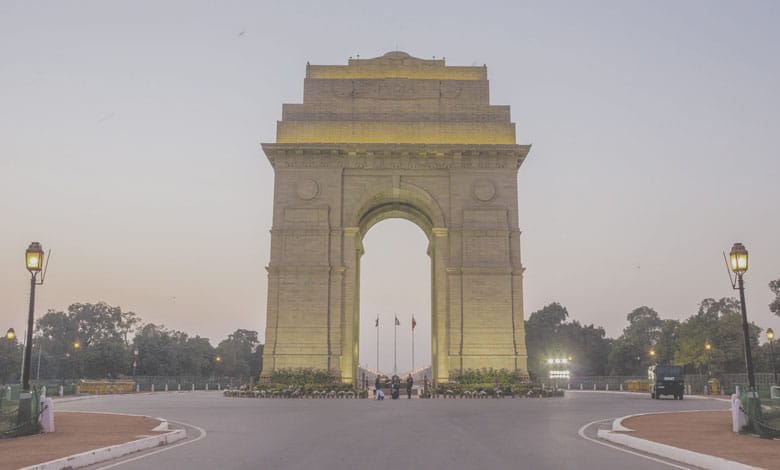Delhi’s Air Quality Deteriorates, AQI Falls Into ‘Very Poor’ Category
The city's air quality has been a cause for concern, with authorities urging residents to take necessary precautions to minimize exposure to harmful pollutants.

New Delhi: Delhi’s air quality took a slight turn for the worse on Thursday morning, with pollution levels increasing and the Air Quality Index (AQI) recorded in the ‘very poor’ category.
The city’s air quality has been a cause for concern, with authorities urging residents to take necessary precautions to minimize exposure to harmful pollutants.
Table of Contents
AQI Recorded at 313, Indicating ‘Very Poor’ Air Quality
As of 9 AM on Thursday, the AQI in Delhi stood at 313, showing a deterioration from the previous day’s AQI of 301 recorded at the same time. This increase in pollution levels placed the air quality firmly in the ‘very poor’ category, according to data from the Central Pollution Control Board (CPCB).
The AQI scale categorizes air quality as follows:
- 0-50: Good
- 51-100: Satisfactory
- 101-200: Moderate
- 201-300: Poor
- 301-400: Very Poor
- 401-500: Severe
While Delhi’s AQI has been hovering in the ‘very poor’ range for several days now, no monitoring stations reported air quality in the ‘severe’ category on Thursday morning. However, a persistent thick layer of haze continued to blanket the national capital, affecting visibility and exacerbating breathing conditions.
Weather Forecast and Temperature Trends
Alongside the deteriorating air quality, Delhi’s weather showed a slight dip in temperature. The city’s minimum temperature was recorded at 10.2°C, which is 0.2 degrees Celsius below normal, as per the India Meteorological Department (IMD). The cool temperatures, coupled with poor air quality, have contributed to the haze that has settled over the city.
Also Read | Schools Shut; Fields Drown: Tamil Nadu Rains Disrupt Life Across Delta Regions
Looking ahead, the IMD forecasted a mainly clear sky for the rest of the day, with the maximum temperature expected to hover around 26°C. Despite the improvement in visibility, the poor air quality continues to pose health risks, particularly for vulnerable groups such as children, the elderly, and individuals with respiratory conditions.
Health Risks and Precautions for Delhi Residents
The ‘very poor’ air quality in Delhi is a growing concern for public health. Prolonged exposure to high levels of particulate matter (PM2.5 and PM10) can lead to respiratory problems, eye irritation, and aggravate pre-existing health conditions. The CPCB and health experts have advised the following precautions for residents:
- Limit outdoor activities: Avoid strenuous outdoor exercises, particularly in the morning and evening when pollution levels tend to peak.
- Use masks: Wear N95 or similar air-filtering masks while going outdoors, especially in areas with high traffic and industrial emissions.
- Keep windows closed: To prevent outdoor pollutants from entering homes and workplaces, it’s advisable to keep windows and doors closed.
- Air purifiers: Consider using air purifiers indoors to improve air quality in enclosed spaces.
- Stay hydrated: Drink plenty of water to help flush out toxins and reduce the effects of air pollution.
The Ongoing Pollution Crisis in Delhi
Delhi has been grappling with poor air quality for several years, especially during the winter months when factors like crop burning, vehicular emissions, construction activities, and low wind speeds combine to worsen pollution levels. Despite efforts to curb pollution, such as the odd-even vehicle scheme and the Graded Response Action Plan (GRAP), the city continues to experience severe air quality episodes that affect millions of residents.
The recent increase in AQI levels highlights the urgent need for continued and enhanced measures to combat pollution. Authorities are working on solutions, but more comprehensive action, including stricter enforcement of pollution control measures and more sustainable urban planning, is necessary to mitigate the health risks associated with poor air quality.
Conclusion: Urgent Need for Action to Address Air Pollution
As Delhi battles ‘very poor’ air quality, the focus needs to shift from short-term measures to long-term solutions for pollution control. With winter just beginning, it’s likely that the air quality will continue to deteriorate in the coming weeks. It remains crucial for both the government and residents to take immediate steps to address the pollution crisis and safeguard public health.
With weather conditions expected to stay relatively clear during the day, the primary concern will continue to be the air quality and the health risks posed by sustained exposure to high levels of pollution.
